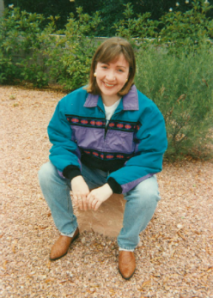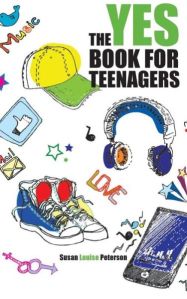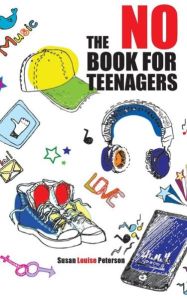 Susan
Louise Peterson is an author and school psychologist living in Las
Vegas, NV. She has taken a twenty year journey working in the tough
inner city schools of Las Vegas, Nevada as a teacher and later a school
psychologist. Susan has worked with students from pre-kindergarten to
high school levels. Working in a large inner city high school she
noticed that many teenagers were dealing with communication issues
related to their parents, teachers and other adults. Students were given
limited information from adults when they asked questions and usually
did not understand the ‘yes’ and ‘no’ type of responses they received
from adults. In response, Susan Louise Peterson wrote two companion
books to help teenagers with this communication dilemma. She is the
author of the newly released books entitled THE YES BOOK FOR TEENAGERS and THE NO BOOK FOR TEENAGERS.
Susan
Louise Peterson is an author and school psychologist living in Las
Vegas, NV. She has taken a twenty year journey working in the tough
inner city schools of Las Vegas, Nevada as a teacher and later a school
psychologist. Susan has worked with students from pre-kindergarten to
high school levels. Working in a large inner city high school she
noticed that many teenagers were dealing with communication issues
related to their parents, teachers and other adults. Students were given
limited information from adults when they asked questions and usually
did not understand the ‘yes’ and ‘no’ type of responses they received
from adults. In response, Susan Louise Peterson wrote two companion
books to help teenagers with this communication dilemma. She is the
author of the newly released books entitled THE YES BOOK FOR TEENAGERS and THE NO BOOK FOR TEENAGERS.Susan is an award winning educator and has won several national awards for improving educational practice. She was named to the Practitioners Hall of Fame for Improvement of Educational Practice from NOVA University.
In addition, Susan is the author of the recently published book IS MY CHILD AUTISTIC OR DELAYED? (Vilnius Press-2013), as well as eight other books in the areas of education, research and child behavior.
You can visit her website at www.susanlouisepeterson.com.
Click here to enter the $25 Amazon Gift Card Giveaway!
ABOUT THE YES BOOK FOR TEENAGERS
 The Yes Book for Teenagers was
written to address the multiple meanings of ‘yes’ as teenagers often
ask parents and adults for numerous requests. Susan Louise Peterson, a
school psychologist has worked in the inner city high schools of Las
Vegas with a large number of teenagers. She has seen the ‘quick and
fast’ requests from teenagers. These requests when answered with a ‘yes’
response often need a little more explanation and detail. It is hoped
this book will help teenagers understand the broader meaning of a simple
‘yes’ response.
The Yes Book for Teenagers was
written to address the multiple meanings of ‘yes’ as teenagers often
ask parents and adults for numerous requests. Susan Louise Peterson, a
school psychologist has worked in the inner city high schools of Las
Vegas with a large number of teenagers. She has seen the ‘quick and
fast’ requests from teenagers. These requests when answered with a ‘yes’
response often need a little more explanation and detail. It is hoped
this book will help teenagers understand the broader meaning of a simple
‘yes’ response.Purchase your copy at AMAZON.
ABOUT THE NO BOOK FOR TEENAGERS
 The No Book for Teenagers seeks
to help teenagers understand why adults (such as parents and teachers
say ‘no’ to them. Teenagers literally have thousands’ of requests and
these requests can cause major disagreements between teens and adults.
Parents and teachers are often helping teenagers understand the ‘bigger
picture’ and some of the challenges they may be facing now and in the
future. The book is written by Susan Louise Peterson, a school
psychologist who has worked with teens in the inner city schools of Las
Vegas, Nevada. As Susan emphasizes in the book, the word ‘no’ can be
connected to many things. She helps teens explore the various meanings
connected with a ‘no’ response.
The No Book for Teenagers seeks
to help teenagers understand why adults (such as parents and teachers
say ‘no’ to them. Teenagers literally have thousands’ of requests and
these requests can cause major disagreements between teens and adults.
Parents and teachers are often helping teenagers understand the ‘bigger
picture’ and some of the challenges they may be facing now and in the
future. The book is written by Susan Louise Peterson, a school
psychologist who has worked with teens in the inner city schools of Las
Vegas, Nevada. As Susan emphasizes in the book, the word ‘no’ can be
connected to many things. She helps teens explore the various meanings
connected with a ‘no’ response.Purchase your copy at AMAZON.
Q: Thank you for this interview, Susan. Can you tell us what your latest books, The Yes Book for Teenagers and The No Book for Teenagers, are all about?
These companion books (The Yes Book for Teenagers and The No Book for Teenagers) were written to help teenagers understand the reasons behind the ‘yes’ and ‘no’ responses from parents and other adults.Q: How did you come up with the idea for your book?
I came up with the idea to write these books from my twin teenage daughters. They were always coming to me with requests and questions that they wanted an immediate ‘yes’ or ‘no’ response. I realized that many of the things they wanted were more complicated and needed a little more explanation than a quick response.Q: What kind of research did you do before and during the writing of your book?
Most of the research for this book comes from my experience working as a school psychologist in a large inner city school district. I have seen teenagers with a multitude of issues so a quick response may sometimes need more clarification or a little more direction.Q: If a reader can come away from reading your book with one valuable message, what would that be?
The message of these books for teenagers is that there are many issues in life and a simple ‘yes’ and ‘no’ response may be to guide them in a new direction or keep them safe.Q: Can you give us a short excerpt?
Excerpt from The No Book for TeenagersQ: In your own experience, is it hard to get a nonfiction book published today? How did you do it?
“No could mean that a change is needed so that you can continue your request. For example, saying ‘no’ might mean you should consider more options and look at the challenges before you change a plan. No could mean that it is an unhealthy request or one that involves bad habits. Sometimes parents may want you to slow down in a relationship or calm down and relax more about a decision. At other times, parents are wanting you to gain independence and they help you in clarifying confusing details as you make adjustments and learn how to be flexible in life.” (The No Book for Teenagers, page 1, 2013, Vilnius Press)
Excerpt from The Yes Book for Teenagers
“When adults tell you ‘yes’ they could be saying that you need to look at the big picture. This could be a hint you are only looking at part of the information or have completed half of the steps in the process. Sometimes your request may lack focus and goes in many different directions. At other times, you may be only focused on one thing.” (The Yes Book for Teenagers, page 12, 2013, Vilnius Press).
I think the key to getting a nonfiction book published is feeling strong about your message and explaining it in simple terms that make it a user friendly book.Q: What’s a typical day like for you?
During the school year, I start my day at 4:30 a.m. and I am at work by 7:00 a.m. It is busy and hectic raising teenagers and working full time. I do jot down notes and ideas throughout the day that can spark my writing ideas when I have time to write and compose material. Sometimes I close the door and write during my lunch hour.Q: What’s next for you?
This summer I have had three books published so I want to work on promoting these books and take a little time to reflect on life.

